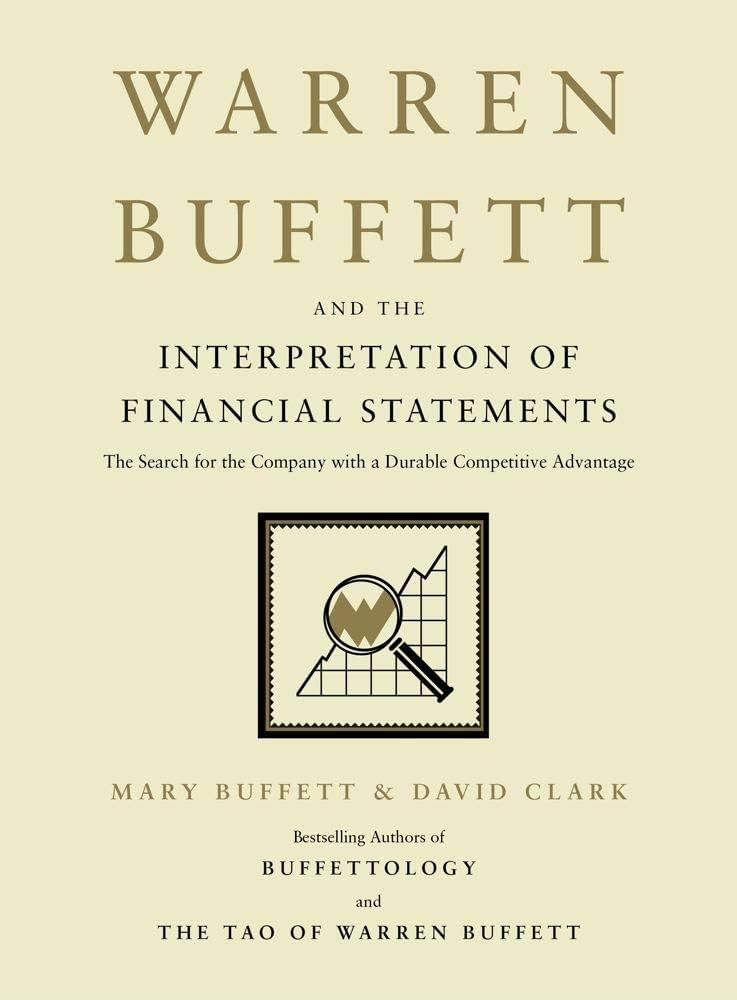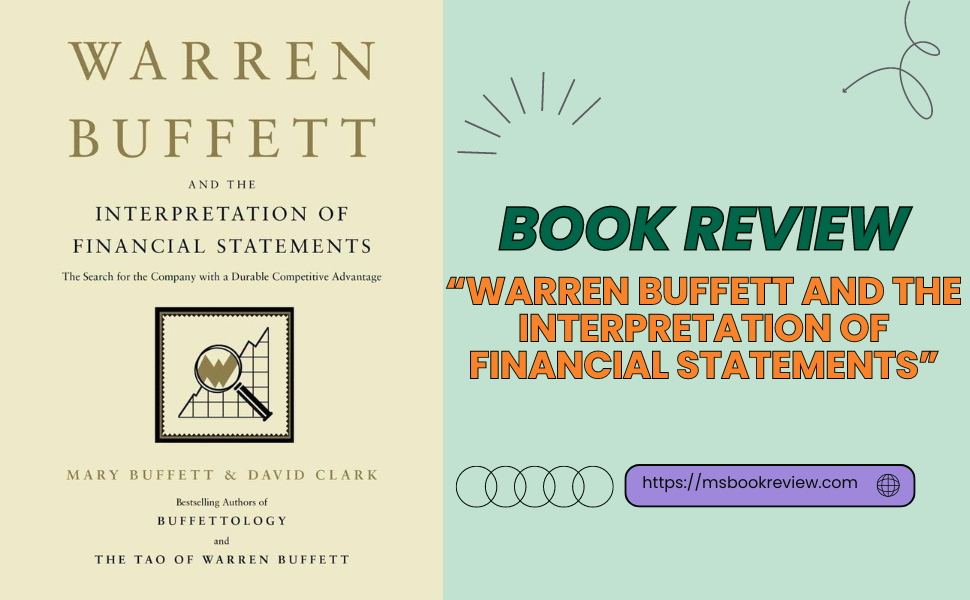Msbookreview.com, how does one of the world’s most successful investors choose which companies to invest in? Warren Buffett and the Interpretation of Financial Statements by Mary Buffett and David Clark offers a rare glimpse into Warren Buffett’s methods for evaluating potential investments.
This book breaks down companies’ financial statements, showing readers how to analyze the numbers just like Warren Buffett does.
Whether you’re a novice investor looking to build your financial literacy or an experienced professional aiming to sharpen your analytical skills, this book provides invaluable insights into the art and science of financial analysis.
Table of Contents
ToggleAuthor of Warren Buffett and the Interpretation of Financial Statements
Mary Buffett and David Clark co-author Warren Buffett and the Interpretation of Financial Statements. Mary Buffett, a former daughter-in-law of Warren Buffett, has spent years studying his investment techniques and authorizes several books on the subject.
David Clark, a seasoned investor and financial expert, has collaborated with Mary Buffett on numerous books, making complex financial concepts accessible to a broad audience.
Together, they provide a detailed and practical guide to understanding financial statements through the lens of Warren Buffett’s investment philosophy.
Synopsis of Warren Buffett and the Interpretation of Financial Statements

Warren Buffett and the Interpretation of Financial Statements is a practical guide that teaches readers how to analyze financial statements using Warren Buffett’s investment criteria.
The book is structured around the three primary financial statements: the income statement, the balance sheet, and the cash flow statement.
Each section breaks down these statements into their key components, explaining what each figure means and how Warren Buffett uses these numbers to assess a company’s financial health and investment potential.
The book begins with an overview of Warren Buffett’s investment philosophy, emphasizing the importance of understanding a business’s intrinsic value.
The authors explain how Warren Buffett looked for companies with durable competitive advantages, strong earnings, and consistent cash flow.
They then guide readers through analyzing financial statements, highlighting the specific metrics and ratios that Warren Buffett considers most important.
For the income statement, the book covers topics such as gross profit margin, operating profit margin, and net earnings.
The balance sheet section delves into assets, liabilities, and shareholder equity, while the cash flow statement is analyzed in terms of operating cash flow, capital expenditures, and free cash flow.
Throughout the book, the authors provide real-world examples and case studies to illustrate how these concepts are applied in practice.
Advantages of Warren Buffett and the Interpretation of Financial Statements
One of the primary advantages of Warren Buffett and the Interpretation of Financial Statements is its practicality.
The book is designed to be a hands-on guide, providing readers with clear, step-by-step instructions on how to analyze financial statements like Warren Buffett’s.
The authors break down complex financial concepts into simple, understandable terms, making the book accessible even to those new to investing.
Another strength of the book is its focus on the metrics and ratios that matter most to Warren Buffett. By zeroing in on the specific financial indicators that Warren Buffett uses to evaluate companies, the authors provide readers with a targeted approach to financial analysis.
This focus helps readers cut through the noise and concentrate on the factors most likely to lead to successful investment decisions.
The book is also enriched with real-world examples and case studies, which help to bring the concepts to life.
These examples allow readers to see how the principles discussed in the book are applied in practice, making the content more relatable and easier to understand.
Disadvantages of Warren Buffett and the Interpretation of Financial Statements
While Warren Buffett and the Interpretation of Financial Statements is an excellent resource, it has limitations.
One potential drawback is that the book could be more expansive in scope. While it provides a detailed guide to analyzing financial statements, it does not cover other important aspects of investing, such as market analysis, portfolio management, or behavioral finance.
Readers looking for a more comprehensive guide to investing may need to supplement this book with additional resources.
Another limitation is that the book focuses on Warren Buffett’s specific investment style, which may only resonate with some readers.
Warren Buffett’s emphasis on value investing and long-term thinking suits his particular approach well. Still, it may not be as applicable to investors with different strategies or goals.
Those who prefer a more aggressive or speculative approach to investing may find the content less relevant.
Additionally, because the book is written for a broad audience, some readers with more advanced financial knowledge may find the content somewhat essential.
While the book is an excellent introduction to financial statement analysis, experienced investors may need to seek out more advanced materials to deepen their understanding.
Personal Opinion about Warren Buffett and the Interpretation of Financial Statements
As someone who read this book, I have a personal opinion about it. Warren Buffett and the Interpretation of Financial Statements is a precious resource for anyone looking to improve their financial literacy and investment skills.
Mary Buffett and David Clark have succeeded in making complex financial concepts accessible, providing readers with a clear and practical guide to analyzing financial statements.
What I appreciate most about the book is its focus on the specific metrics and ratios that Warren Buffett uses to evaluate companies.
This targeted approach allows readers to hone in on the factors most likely to lead to successful investment decisions.
The book’s clear explanations and real-world examples make it a valuable tool for novice and experienced investors.
However, I also recognize that the book’s narrow focus may appeal to only some. While it is an excellent resource for learning how to analyze financial statements, it covers only some critical aspects of investing.
That said, for those specifically interested in Warren Buffett’s approach to economic analysis, this book offers invaluable insights that can help sharpen their investment skills.
Moral Message of Warren Buffett and the Interpretation of Financial Statements
The moral message of Warren Buffett and the Interpretation of Financial Statements is that successful investing is rooted in a deep understanding of the businesses you invest in.
Warren Buffett’s approach to investing is not about chasing trends or making quick profits; it’s about taking the time to thoroughly analyze a company’s financial health and making informed decisions based on solid data.
The book also emphasizes the importance of patience, discipline, and long-term thinking. Warren Buffett’s success as an investor is a testament to the power of these qualities, and the book encourages readers to adopt the same mindset in their investment journeys.
Investors can build wealth over time and achieve financial success by focusing on the fundamentals and staying committed to a value-driven approach.
Conclusion
Warren Buffett and the Interpretation of Financial Statements by Mary Buffett and David Clark is a must-read for anyone looking to deepen their understanding of financial statement analysis and improve their investment skills.
The book offers a practical, step-by-step guide to analyzing financial statements using Warren Buffett’s criteria, providing readers with invaluable insights into investing.
As you explore the pages of this book, you’ll gain a deeper appreciation for the importance of financial literacy and its role in successful investing.
Whether you’re a novice investor looking to build your skills or an experienced professional seeking to refine your approach, Warren Buffett and the Interpretation of Financial Statements offers a wealth of knowledge that can help you navigate the complexities of the financial world with confidence and success.
In a world where financial literacy is more important than ever, this book provides the tools and insights to make informed, intelligent investment decisions.











